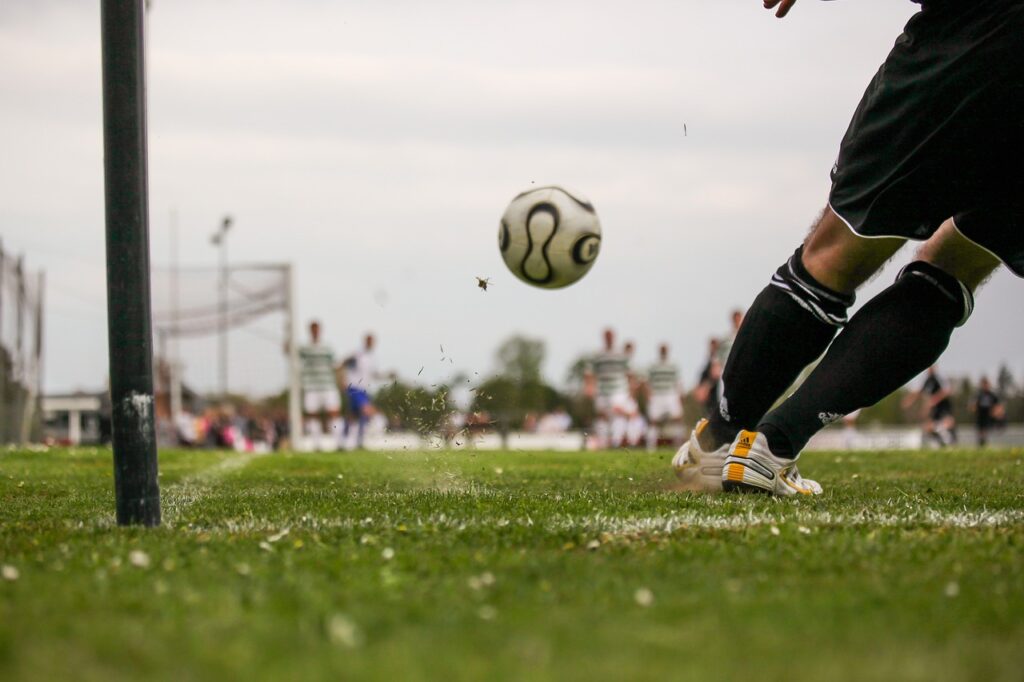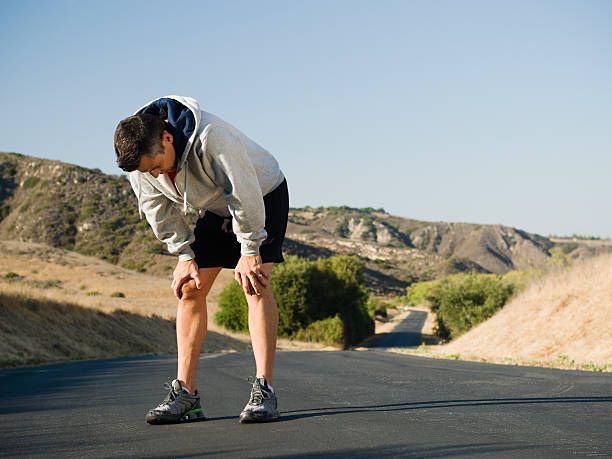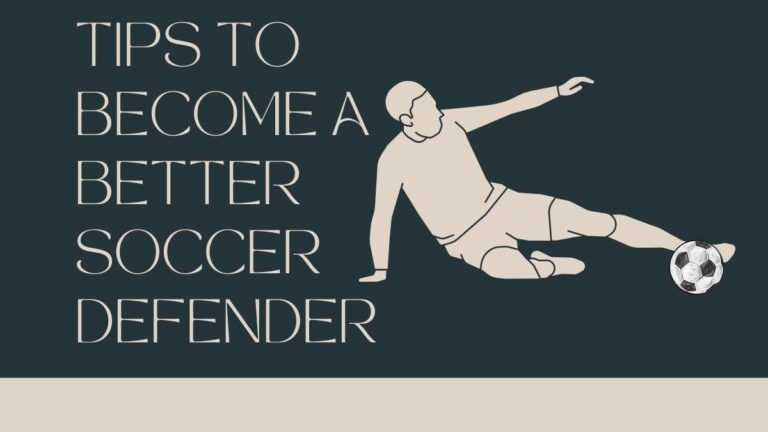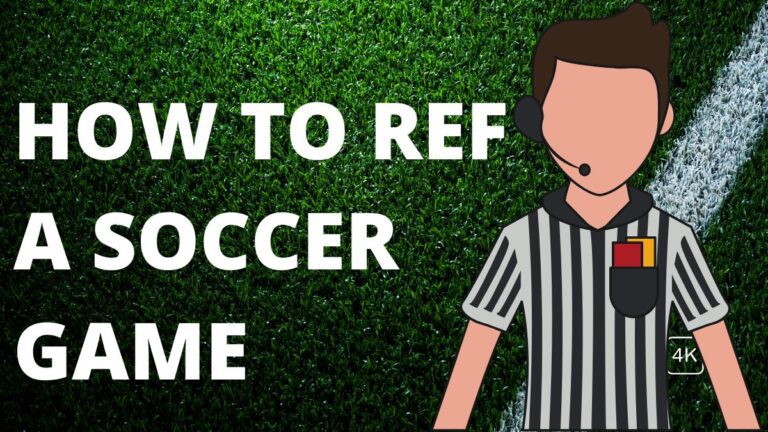How to Get Better at Soccer? – A Full Guide (2024)
Soccer is a sport loved by millions of people worldwide. Whether you’re a beginner or a seasoned player, there’s always room for improvement. Becoming a better soccer player takes dedication, hard work, and consistent practice. It requires a combination of physical fitness, technical skill, and mental toughness. However, by focusing on certain things, everyone can learn how to get better at soccer.
Fortunately, with the right mindset and approach, anyone can improve their game. In this article, we will explore some tips, tricks, training drills, and exercises to help you get better at soccer and take your game to the next level.

Whether you’re a casual player or aspiring professional, these insights will help you hone your skills and become a more formidable opponent on the field.
5 Tips to Become a Better Soccer Player
Here are some tips that can help you become a better soccer player instantly:
1. Choosing the perfect soccer gear
Choosing the right soccer gear is crucial for any soccer player who wants to improve their performance on the field. Your gear not only affects your comfort during soccer games but also your ability to move freely and perform at your best. When selecting soccer gear, focus on quality and durability rather than style or popularity.

Invest in a good pair of soccer cleats that fit well and are designed for your playing surface. Choose a comfortable and breathable soccer uniform that allows for ease of movement. Additionally, consider wearing shin guards to protect your legs from injuries.
The right soccer gear can give you the confidence you need to play at your best and enhance your overall performance.
2. Choosing the perfect soccer position
Choosing the perfect soccer position is essential for any player who wants to improve their game. Each position on the field has specific roles and responsibilities, and finding the right fit for your strengths and weaknesses can make all the difference in your performance.
When choosing your position, consider your physical attributes, such as your height, weight, and speed, as well as your technical skills, such as your passing, shooting, and dribbling abilities. It’s also important to think about your personality and how you work in a team.
Whether you prefer to be in the middle of the action or have a more supportive role, there’s a position on the field that will suit you best.
3. Improving Technical Skills
Improving technical skills is crucial to become a better soccer player. Technical skills refer to the player’s ability to control and move the ball with their feet, body, and head. To improve technical skills, players must practice regularly and focus on specific techniques, such as dribbling, passing, shooting, and trapping.

A good way to enhance technical skills is to break down the techniques into smaller parts and practice them individually. For example, players can practice their passing technique by standing close to a wall and passing the ball back and forth with one foot or practice dribbling by running through cones placed in a straight line.
Consistent practice will help players develop muscle memory, allowing them to execute techniques more smoothly and effectively during games.
4. Improving Stamina & Endurance
Stamina and endurance are crucial for any soccer player, as it helps in sustaining their performance throughout the game. To improve your stamina and endurance, you need to focus on cardio exercises such as running, cycling, and swimming. These activities will help you build your cardiovascular fitness and increase your endurance levels.

Additionally, you can incorporate high-intensity interval training (HIIT) and sprint training to improve your stamina. These types of workouts help you to develop your anaerobic threshold, which is the point at which your whole body just switches from using oxygen to using stored energy to fuel your muscles.
Finally, ensure that you eat a well-balanced diet and get enough rest, as these factors also play a crucial role in building your endurance and stamina levels.
5. Improving Tactical Intelligence
Improving tactical intelligence is an important aspect of becoming a better soccer player. Tactical intelligence refers to the ability to read and understand the game, anticipate the movements of your opponents and teammates, and make effective decisions on the field.
One way to improve your soccer knowledge and tactical intelligence is to study the game and learn from more experienced players and coaches. Watch professional matches and analyze the tactics used by successful teams. Pay attention to how players move on the field, how they position themselves, and how they communicate with their teammates.
Additionally, practicing small-sided games and drills can help you improve your decision-making skills and develop a better understanding of the game. By constantly working on your tactical intelligence, you can become a more well-rounded and effective player on the field.
The Key to Improve as a Soccer Player – Training By Yourself
Improving as a soccer player requires a combination of hard work, dedication, and skill development. While team training sessions are important, practicing on your own can also help you gain an edge on the field.
Whether you’re a beginner or an experienced player, training by yourself can be an effective way to improve your skills and take your game to the next level.
1. Find your Why
When it comes to improving as a soccer player, finding your “why” is crucial. It refers to identifying your motivation and the reason why you want to get better. Your “why” will keep you focused and driven, especially during difficult times when it’s easy to give up.

It could be anything from wanting to make your team, to achieving a personal goal, or even just wanting to have fun and enjoy the game more. Once you’ve found your “why,” make sure to remind yourself of it regularly to stay motivated and on track.
2. Where and What You Need
To start training by yourself to improve as a soccer player, you need to first determine where you will be practicing and what equipment you will need. Find a flat surface such as a soccer field, a park, or your backyard that has enough space to practice your soccer skills on. You will need a soccer ball, and some cones or other markers to set up drills and exercises.
Additionally, if you plan to do any physical conditioning, such as sprints or agility drills, make sure you have appropriate footwear and clothing. With the right location and equipment, you can begin your journey to becoming a better soccer player on your own.
3. Recommended Drills
Here are some recommended drills that you can do on your own:
Wall Drills
Wall drills are an excellent way to improve your technical skills and overall soccer ability. All you need to practice shooting with is a ball and a sturdy wall.
Start by standing a few feet away from the wall, facing it. Then, kick the ball against the wall with your right foot and then with your left foot. As the ball comes back to you, control it with the inside of your foot and pass it back against the wall with your opposite foot.
Repeat this pattern as many times as you can in a set amount of time or until you feel fatigued. Wall drills can help improve your first touch, passing accuracy, and overall ball control, making you a better soccer player in no time.
Stamina & Dribbling Drills

Stamina and dribbling are two essential skills for soccer players to have. There are a variety of drills that can help improve these skills.
One effective drill for improving stamina and dribbling is the box-to-box drill. To do this drill, set up two cones approximately 20 yards apart. Start at one cone and dribble the ball to the other cone as fast as possible, performing a specific move or combination of moves at each cone.
Then, jog or walk back to the starting cone and repeat the drill. This drill is great for improving endurance, as well as dribbling ability and quickness on the ball.
Another effective drill for improving stamina and dribbling is the shuttle run. Set up cones approximately 10 yards apart in a straight line. Start at one end and sprint to the first cone, touch it, then sprint back to the starting point. Then, sprint to the second cone, touch it, and sprint back to the starting point.
Continue this pattern, touching each cone until you reach the end of the line. This drill is great for improving speed, endurance, and dribbling and passing ability, as it requires the player to change directions quickly while maintaining control of the ball.
To learn more, check out our article on how to improve stamina for soccer.
Shooting & Passing Drills
Improving your shooting and passing skills is crucial for becoming a better soccer player. Some of the best drills for these skills include passing and shooting drills, and long passes, such as the wall pass drill, where you pass the ball back and forth with a wall using different parts of your feet, or the passing square drill, where you pass the ball to teammates in a square formation.
Additionally, shooting drills such as the one-on-one shooting drill, where you practice taking shots against a goalie, or the long-range shooting drill, where you practice taking shots from a distance, can help you improve your accuracy and power.
These drills can be practiced alone or with a partner and can be customized to fit your specific needs and skill level.
How to get the Most Out of These Drills

To get the most out of these drills, it’s important to focus on technique and repetition. Make sure you’re using proper form and technique for each drill, and perform them at game-like speed.
It’s also important to push yourself and aim for improvement each time you do the drills. Keep track of your progress and set goals for yourself to achieve.
Additionally, it’s a good idea to vary your drills and mix them up to keep things interesting and challenge yourself in different ways. Finally, don’t forget to incorporate rest and recovery into your training routine to allow your body to properly repair and strengthen.
By putting in consistent effort and focusing on technique and progression with soccer drills, you’ll be well on your way to improving your skills and becoming a better soccer player.
Working on Your Weaknesses
As a soccer player, it’s essential to identify and work on your weaknesses to become a well-rounded player. If you’re unsure of your weaknesses, ask your coach or teammates for feedback. Once you’ve identified your weaknesses, create a plan to work on them.
For example, if you struggle with your left foot, make it a priority to incorporate left-footed drills into your training routine. Or, if you have a hard time controlling the ball when it’s in the air, spend extra time working on your heading skills.
It’s important to challenge yourself and step out of your comfort zone to improve. Remember, every weakness is an opportunity for growth, so embrace the challenge and put in the work to become the best player you can be.
Giving the Extra Mile
Giving the extra mile means going above and beyond what is expected of you. In soccer, this can mean staying after practice to work on a specific skill or doing additional conditioning exercises outside of team training sessions.
By putting in extra effort, you can improve your performance on the field and stand out to coaches and teammates. It also demonstrates your dedication and commitment to the sport, which can inspire others and lead to greater success for the team. Remember, improvement and success require hard work, and giving the extra mile can make all the difference.
If you want to give the extra mile and become even better, then you could also focus on your nutrition and mental conditioning
1. Working on Nutrition
Working on nutrition is an essential aspect of improving as a soccer player. A balanced and healthy diet can provide you with the energy and nutrients you need to perform at your best. Eating a diet rich in protein, complex carbohydrates, healthy fats, vitamins, and minerals can help you improve your strength, endurance, and recovery.
Make sure to eat a balanced meal at least 2-3 hours before a training session or a game and hydrate yourself well to avoid cramping and fatigue. Avoid processed foods, sugary drinks, and excessive caffeine as they can hinder your performance. Proper nutrition combined with regular training can help you take your game to the next level.
2. Mental Conditioning
Mental conditioning is an essential aspect of soccer training. A player’s mental state can significantly impact their performance on the field. There are various ways to improve mental conditioning, such as visualization and positive self-talk.
Visualization involves imagining yourself succeeding in specific situations, like scoring a goal or making a crucial save. Positive self-talk involves using affirmations and encouraging statements to boost confidence and stay motivated.
Other mental conditioning techniques include goal-setting, meditation, and breathing exercises. By incorporating mental conditioning techniques into your training routine, you can improve your focus, reduce anxiety, and enhance your overall performance.
How to Know If You Are Overtraining

Overtraining occurs when an individual trains beyond their body’s capacity to recover. It can happen to anyone, from beginners to professional athletes. The symptoms of overtraining can be physical, such as fatigue, soreness, and decreased performance, as well as mental, including irritability, mood swings, and decreased motivation.
One of the most effective ways to prevent overtraining is to listen to your body. If you feel consistently exhausted or unable to perform at your usual level, you may be overtraining.
Additionally, it’s essential to incorporate rest and recovery into your training routine. Make sure to take at least one day off per week, prioritize sleep and hydration, and vary your training routine to avoid overuse injuries.
Finally, it’s essential to be honest with yourself about your goals and motivation for training. It’s easy to get caught up in the idea that more training always equals better results, but sometimes, taking a step back and allowing yourself to rest and recover can be the best thing you can do for your progress.
Frequently Asked Questions (FAQ)
- How to get better at playing soccer as a kid?
If you’re a kid looking to improve your soccer skills, there are a few things you can do to get better. First and foremost, make sure you’re having fun! Soccer should be enjoyable and it’s easier to get better at something when you’re enjoying it. Secondly, practice, practice, practice! The more you play and practice, the better you will become.
It’s important to focus on developing your fundamental skills like passing, dribbling, and shooting. Additionally, try to watch as many professional soccer games as you can to learn from the best players in the world.
Finally, don’t be afraid to ask for help or guidance from a coach or a more experienced player. With dedication and hard work, you can become a great soccer player even as a kid. - How long should you do soccer practice?
The length of soccer practice can vary depending on the age and skill level of the players. Younger players may have shorter practices, typically lasting around 60 minutes, while more experienced players may practice for up to 2 hours.
It is important to ensure that players have enough time to warm up and cool down properly and to incorporate breaks as needed to prevent fatigue and injury. The focus should be on quality over quantity, with drills and exercises tailored to the specific needs of the players. It is also important to allow for rest days to allow for proper recovery and avoid overtraining. - Is soccer easy to get good at?
Soccer, like any sport, requires practice and dedication to get good at. While some people may have a natural talent for the game, becoming a skilled soccer player requires effort and hard work.
With consistent training, a positive attitude, and a willingness to learn from mistakes, anyone can improve their skills on the field.
However, it is important to remember that improvement takes time and patience, and there may be setbacks along the way. So, while soccer may not be easy to get good at, it is definitely possible with the right mindset and approach. - How long does it take to get really good at soccer?
Getting really good at soccer requires consistent practice and dedication. It is difficult to determine a specific timeline as everyone has different learning curves and abilities. However, typically it can take several years of consistent practice to become a highly skilled player.
This includes working on technical skills, physical fitness, tactical understanding, and mental toughness. It is important to remember that improvement is a continuous process and it is important to focus on progress rather than perfection. With the right mindset and effort, anyone can become a skilled soccer player. - How can I improve my IQ in soccer?
Improving your IQ in soccer involves studying the game and analyzing your performance. This means watching professional games, studying tactics, and reviewing your own game footage.
You can also work on your decision-making skills and spatial awareness by playing small-sided games and practicing drills that focus on quick decision-making. Regularly challenging yourself and seeking feedback from coaches and teammates can also help improve your soccer IQ.
To read more about how you can improve your soccer IQ, check out our full guide on improving soccer intelligence.







